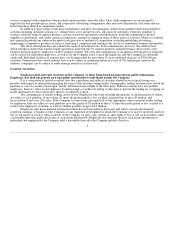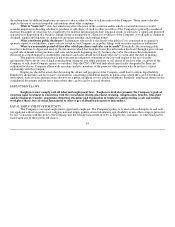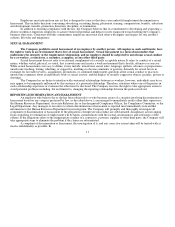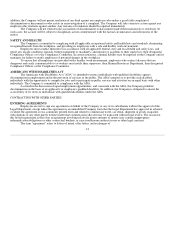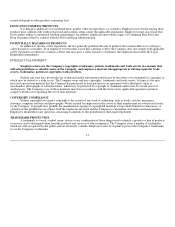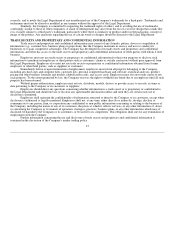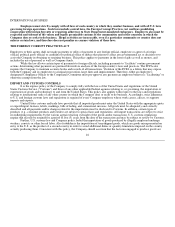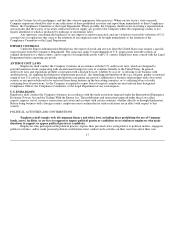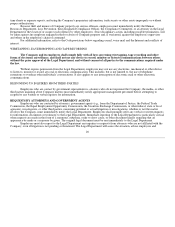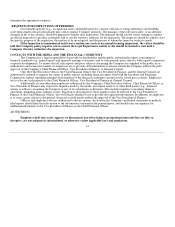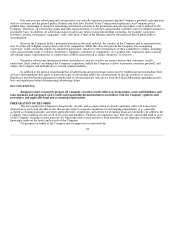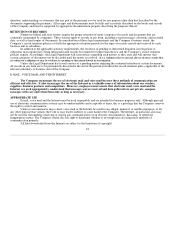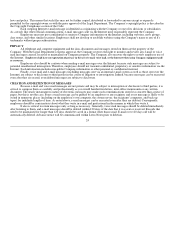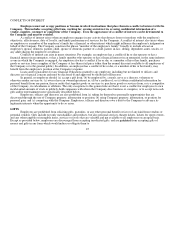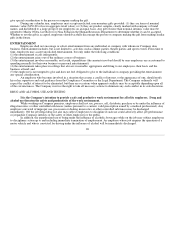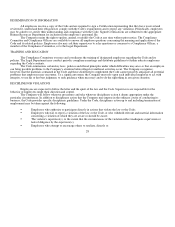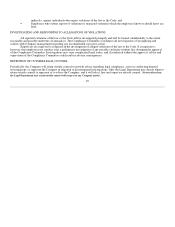Neiman Marcus 2002 Annual Report Download - page 156
Download and view the complete annual report
Please find page 156 of the 2002 Neiman Marcus annual report below. You can navigate through the pages in the report by either clicking on the pages listed below, or by using the keyword search tool below to find specific information within the annual report.
uncustomary gifts or services to or from others with whom the Company does business or seeks to do business, regardless of whether
such gifts or services constitute unlawful or otherwise improper payments. Additional information concerning this prohibition is
included in the discussion of conflicts of interest.
The Company is legally required to collect sales tax in all states where it conducts business. Each state's law varies in the
requirements for collecting tax, ranging from different tax rates to varied taxable items. It is mandatory that the Company comply with
the laws that the states have put into place. An employee shall never offer a customer the option or opportunity to ship a purchase in
order to avoid paying sales tax.
The Point of Sale (POS) system has been programmed to collect the proper sales tax in each store and account for most tax
exceptions. All employees shall abide by the rules set forth in the Company's Sales Tax Policy. Failure to adhere to these rules will
result in disciplinary action up to and including termination of employment.
FALSE STATEMENTS AND SCHEMES TO DEFRAUD
Employees shall not engage in any scheme to defraud any customer, supplier or other person or entity with whom the
Company does business or seeks to do business. In addition, employees are prohibited from wrongfully withholding or
converting the property of others, making untruthful statements about the Company's products and services, willfully
concealing material facts from anyone with whom the Company does business or seeks to do business, and knowingly making
commitments that the Company cannot fulfill.
These prohibitions are particularly critical when dealing with government officials. Employees shall not knowingly or
willfully make or cause to be made oral or written false statements to government officials, or conceal or cause to be concealed
material facts called for in a governmental report, application, filing, investigation or request for information. An employee can violate
this policy and the law even if the employee does not personally make the false statement or conceal the material fact. For example,
employees are prohibited from providing false information to any other employee or third party knowing that the information will be
(or is likely to be) provided to the government. For additional information, please also see the policy described below concerning
responses to inquiries from third parties.
THEFT OR MISUSE OF COMPANY PROPERTY
All employees shall protect the Company's assets and ensure their efficient use. All Company assets should be used
for legitimate business purposes only. Theft, carelessness and waste have a direct impact on the Company's profitability.
Employees shall not steal or misuse Company assets, provide any products to any person or entity not in accordance with
established Company policy, or retain any uncustomary personal benefit from a customer, vendor, supplier or other person
with whom the Company does business or seeks to do business.
Employee theft or misuse of Company property can take many different forms including, but not limited to: stealing the
Company's supplies, equipment or other property; misusing the Company's equipment, such as telephones, computers, photocopy
machines or telecopiers; misusing employee discounts; submitting falsified
19


